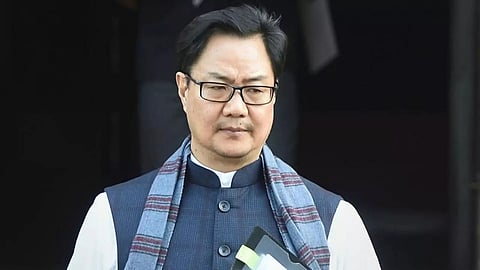
- Home
- Live Blog
- Breaking News
- Top Headlines
- Cities
- NE News
- Sentinel Media
- Sports
- Education
- Jobs

NEW DELHI: The independence of the judiciary has been put in danger, with Union Law and Justice Minister Kiren Rijiju now saying that it is the government's job to appoint judges.
To bolster his contention, Rijiju has claimed that people of the country are not satisfied with the collegium system and are also putting a question mark on the spirit of the Indian Constitution.
Rijiju was addressing an event in Ahmedabad on Monday, reportedly organised by the Rashtriya Swayamsevak Sangh (RSS), where the minister related his observation about judges being 'preoccupied half of the time' deciding the appointments. He added that the judges' primary job of delivering justice is suffering due to this.
Last month in Udaipur, Rijiju had said at a conference that the collegium system needs a rethink regarding appointments in the higher judiciary.
"Till 1993, every judge in India was appointed by the law ministry in consultation with the Chief Justice of India. We had very eminent judges at that time," Rijiju had said.
He further went on to add, "The Constitution is clear about it. It says that the President of India will appoint judges, which means the law ministry will appoint judges in consultation with the Chief Justice of India."
"The Supreme Court in 1993 defined consultation as concurrence. In no other field has consultation been defined as concurrence but in judicial appointments," he remarked.
The Law minister also pointed out that the collegium system had been expanded by the judiciary in 1998.
The Supreme Court collegium is headed by the CJI (Chief Justice of India) and comprises four other senior most judges of the court. A High Court (HC) collegium is led by its Chief Justice and four other senior most judges of that court. Names recommended for appointment by a HC collegium reaches the government only after approval by the CJI and the SC collegium.
Several factors go against the collegiums system, some of them being- opaqueness and a lack of transparency, scope for nepotism, embroilment in public controversies and that it overlooks several talented junior judges and advocates.
While there is a provision that the government can raise objections or seek clarifications regarding the recommendations by the collegiums, it is bound by procedure and precedent to clear the names if the five-member body reiterates them.
Rijiju went on to say, "I am aware that the people of the country are not happy with the collegium system of appointment of judges. If we go by the spirit of the Constitution, appointing judges is the job of the government. Secondly, nowhere in the world except India is there a practice that judges appoint their brothers as judges."
"Third, as the law minister, I have observed that half of the time and minds of judges are preoccupied with deciding who will be the next judge. Their primary work is to give justice, which suffers due to this practice," the Law minister pointed out.
There was an attempt made to replace the collegiums system by a 'National Judicial Appointments Commission' (through Ninety-ninth Amendment Act, 2014), but it was struck down by the court in 2015 on the ground that it posed a threat to the independence of the judiciary.
Also watch: